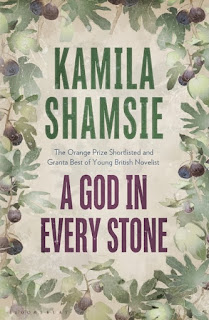By:
Ullah, Inam Gul. iukhan233@gmail.com
A God in Every Stone is an elegantly written prose work by
Kamila Shamsie, a renowned postcolonial Pakistani writer. The novel is set in
different countries such as Turkey, France and India (Peshawar). The novel
gives a vivid description of the colonial India, the days the British Empire
was at zenith and its subsequent collapse and rise of the freedom movement in
India. The novel especially describes the Pashtun’s contribution to the Indian freedom
movement, the sacrifices Pashtun people have made in their anti-colonial
resistance they offered to the Empire culminating the Pashtun massacre at the
Kissa Khani in 1930. It also gives us a profile of the history of Peshawar and
the Pashtun people way of life popularly called Pakhtunwali.
The opens with operation at an archeological site in Turkey
led by Tehsin Bay, who is soon joined by Englishwoman Vivan Spencer Rose, a
English young girl with extrovert personality. In the meanwhile the First World
War breaks out, and the scene is shifted to Brighton where we see Indian
soldiers fighting on behalf of the Empire. Among the soldiers, Qayyum Gul and
Kalam Khan are the prominent ones. Qayyum Gul receives injuries in the war,
loses one of his eyes and is admitted into hospital Brighton. Qayyum becomes
much more loyal and an admirer of the Empire, however, he is afterwards
discharged and he heads back to his hometown Peshawar. On the train he meets
with the Englishwoman Vivian Rose who is also on her way to Peshawar to execute
an archeological project at Shah Ji Dheri near Peshawar. She had been motivated
by Tahsin Bay to dig out the circlet left by Scylax the noted Greek explorer. Qayyum
and Viv develops a nodding acquaintance during the journey, however they part
in different directions at the station. Najib Gul , Qayyum ‘s younger brother,
who had come to receive his brother at the station, misses to see him and gets
hired by Vivian Rose as her guide.
Najib gets closer to the woman and becomes her guide, Viv in
turn teaches him lessons in history and English language. Najib gradually
develops interest in archeology and history and finally receives a degree
from the Islamia College Peshawar in
history. Qayyum Gul in the meanwhile receives his ex- colleague
Kalam Khan. On his return to his Peshawar, Kalam khan turns totally against the
Empire and its control over his land. Both Qayyum Gul and Kalam khan join the
Indian freedom movement in two different modes.
Kalam Khan joins the armed resistance, called Jihad, against
the British colonial rule , led by Haji of Turagnzai. In their fight in the
beginning, the British forces suffer losses during the tussles at various
points in the Pashtun province (NWFP). The movement, however, does not last for
long, and Haji Sahib, takes refuge in the Mohamand Agency and resorts to
guerilla war.
Qayyum Gul on the other hand joins the Khudai Khidmatgar(Servant
of God), a multi layered movement encompassing, social reformation, education,
political awareness and purification of religion among the Pashtun masses, and
unarmed resistance against the British. The movement is led by Ghaffar Khan
popularly known as Bacha Khan. Qayyum
Gul joins the movement as a teacher in one of the Azad Madrassas opened up by
the Khudai Khidmatgar. Qayyum in the meanwhile tries to convince his brother
Najib to abandon his services to the Englishwoman and join his own freedom
movement instead. But Najib pays no attention to his words.
As freedom movement gains momentum and people across the India
start to participate in the resistance movement under the All India Congress,
Khudai Khidmatgar joins the movement and becomes a provincial chapter of the
Congress. When the Congress gives call
of the Civil Disobedience Movement across the India, Khudai Khidmatgar calls
for a demonstration on April 23, 1930 at the Kissa Khani protesting against the
arrest of their leaders. On the day of the demonstration, the British forces
opens indiscriminate firing on the unarmed and peaceful demonstrators which results
into loss of the hundreds of innocent lives of Pashtun people. Najib Gul, who
had been averse to his brother activities and was more loyal to the Empire,
finally participates in the rally and turns to be a volunteer of the Khudai
Khidmatgar standing against the British troops in support of his own
countrymen.
The novel gives a rich account of pre-partition Indian
history, colonial administration, the British colonial mindset, the atrocities
they had committed for maintaining their rule in India, the rise of freedom
movement in India, and the contribution of Pashtun people to the freedom
movement and losses they have suffered and sacrifices made therein.
Read Also:
